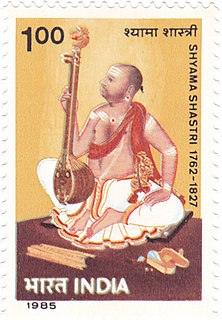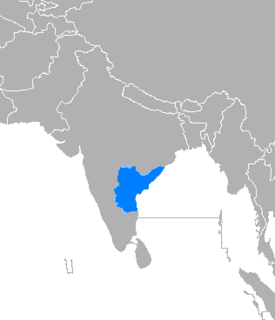
Muthuswami Dikshita or Dikshitar was a South Indian poet, singer and Veena player, and a legendary composer of Indian classical music, who is considered one of the musical trinity of Carnatic music. His compositions, of which around 500 are commonly known, are noted for their elaborate and poetic descriptions of Hindu gods and temples and for capturing the essence of the raga forms through the vainika (veena) style that emphasises gamakas. They are typically in a slower speed. He is also known by his signature name of Guruguha which is also his mudra. His compositions are widely sung and played in classical concerts of Carnatic music.

Shyama Shastri or Syama Sastri was a musician and composer of Carnatic music. He was the oldest among the Trinity of Carnatic music, Tyagaraja and Muthuswami Dikshitar being the other two.
Gudalur Narayanaswamy Balasubramaniam, popularly known as GNB, was an Indian Carnatic singer. He innovated the art through emphasis on laya control and reducing the gamakas which eventually made Carnatic music appeal to the lay and the learned alike. He, along with his contemporaries Semmangudi Srinivasa Iyer and Madurai Mani Iyer, are referred to as the 20th century male trinity of Carnatic music. He was also a Tamil film actor.

Music of Tamil Nadu has a long tradition and history going back thousands of years. Music is a very important aspect of the culture of the Tamil people.
Karthik Raja is an Indian composer based in Chennai, India. He made his debut as film composer in the Tamil film Pandiyan (1992) and went on to score music for many critically and commercially acclaimed feature films.

Harikesanallur Muthiah Bhagavatar, commonly known as Muthiah Bhagavatar, is one of Carnatic classical music's famous twentieth-century composers. He also created about 20 ragas.
Muthu Thandavar (Tamil:முத்துத்தாண்டவர்)was composer of Carnatic music. He was an early architect of the present day Carnatic kriti (song) format, which consists of the pallavi (refrain), anupallavi and charanam. He lived in the town of Sirkazhi in Tamil Nadu. His contributions to Carnatic music have been largely forgotten and not many of his kritis are in vogue today. Muthu Thandavar, along with Arunachala Kavi (1712–1779) and Marimutthu Pillai (1717–1787) are known as the Tamil Trinity of Carnatic music.
Arunachala Kavi (1711–1779) was a Tamil poet and a composer of Carnatic music. He was born in Tillaiyadi in Thanjavur District in Tamil Nadu. The three Tamil composers Arunachala Kavi, Muthu Thandavar and Marimutthu Pillai are considered the Tamil Trinity, who contributed to the evolution of Carnatic music.
Gopalakrishna Bharati (1810–1896) was a Tamil poet and a composer of Carnatic music. He wrote a kathakalatchepam, Nantanar Charittiram, two other works in this genre, and many independent kritis.
Pallavi Seshayyer (1842–1909) was a composer of Carnatic music, who followed the traditions of the famous composer Tyagaraja. Seshayyar was a singer in the court of the king of Mysore. As a singer, he was an expert of the techniques of Ragam-Thanam-Pallavi, a unique style of singing Carnatic music. This expertise gave him his epithet Pallavi Seshayyar. He could also compose exploiting rare Ragas.
Akumadugula Manambuchavadi Venkatasubbaiyya (1803–1862) was a Carnatic music composer. He composed the varnam Jalajakshi, in raga Hamsadhwani. He was a cousin and a direct student of the famous composer Tyagaraja. He was an accomplished singer and a renowned teacher. He was a scholar in Telugu and Sanskrit.He composed in Telugu Language.

Maha Vaidyanatha Sivan (1844–1893) was a composer of Carnatic music. He was a great exponent of extemporaneous singing. He also composed a ragamalika with all the 72 melakartha ragas.
Poochi Srinivasa Iyengar, also known as Ramanathapuram Srinivasa Iyengar, was a singer and composer of Carnatic music. He was born in Ramanathapuram in Tamil Nadu on August 16, 1860. He studied music under Patnam Subramania Iyer, a singer of Carnatic music and came in the sishya parampara of Saint Thyagaraja. He had a large number of disciples, of whom the most popular was Ariyakudi Ramanuja Iyengar. He composed over 100 songs and used the mudraSrinivasa in his compositions. He died on July 20, 1919.
Papanasam Ramayya Sivan was a composer of Carnatic music and a singer. He was awarded the Madras Music Academy's Sangeetha Kalanidhi in 1970. He was also a film score composer in Kannada cinema as well as Tamil cinema in the 1930s and 1940s.
The Trinity of Carnatic music, also known as The Three Jewels of Carnatic music, refer to the outstanding trio of composer-musicians of Carnatic music in the 18th century, being Tyagaraja, Muthuswami Dikshitar and Syama Sastri. Prolific in composition, the Trinity of Carnatic music are known for creating a new era in the history of Carnatic music by bringing about a noticeable change in what was the existing Carnatic music tradition. Compositions of the Trinity of Carnatic music are recognized as being distinct in style, and original in handling ragas. All three composers were born in Thiruvarur, formerly part of Thanjavur District in Tamilnadu. Along with Purandaradasa, the Pitamaha or father of Carnatic music, the trinity are considered in a way the greatest musicians and composers of the tradition.
The Haridasas, the Vaishnava saints of Karnataka, are classified into the Vyasakuta and Dasakuta. The Vyasakuta were the pontifical saints known for their scholarship and exposition of the Madhva's philosophy. The Dasakuta were the peripatetic saint disciples of the Vyasakuta sanyasins. They were proficient singers and composers and used classical music and the Kannada language as a medium to propagate the teachings and philosophy of the Dvaita school. While Sripadaraya is sometimes credited with starting this musical movement, Purandaradasa, a disciple of Vyasaraya, became renowned as Karnataka Sangita Pitamaha.
Srinivas is a playback singer who has sung over 2000 songs in Tamil, Malayalam, Telugu, Kannada and Hindi. He has also worked independently as a music composer, working on films and private albums.

Gobalsamy Ramanathan was an Indian music composer for Tamil movies. He is also known as Isai Methai or Sangeetha Chakravarthy and is considered to be one of the influential Tamil music composers to take Carnatic music to the masses. Notable for his association with M. K. Thyagaraja Bhagavathar. G. Ramanathan also composed for films of Salem Modern Theatres and Coimbatore Central Studios. His career lasted until his death in 1963. During the 1950s G.Ramanathan's music dominated most of the box office hits of the then leading Tamil movie stars Shivaji Ganesan and M. G. Ramachandran.

Vidyasagar also known as "Gaanaa" Vidyasagar is an Indian composer, musician and singer best known for his super hit/blockbuster songs who works predominantly in the Malayalam, Telugu, Tamil and Hindi film industries. After working with several composers as assistant and conductor, Vidyasagar made his debut as a film composer in the 1989 Tamil film Poomanam. Working for over 225 feature films, he is the recipient of the prestigious National Award and five Filmfare Awards.








